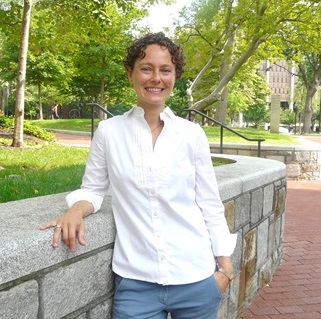
Ph.D. sociology student Amanda Barrett Cox
Photo credit: Marcus Wright
Thursday, July 7, 2016
By Nan Myers
How does an organization develop complete buy-in from its members? In order to answer that question, Amanda Barrett Cox, CGS'04 GED'09 GR'18, conducted and published a study about how organizations that make significant physical, emotional, and intellectual demands foster commitment and loyalty from voluntary participants—and as a result, thrive.
In the study, published this past May in Sociological Forum Cox builds on the Greedy Institution theory posited by noted German-American sociologist Lewis A. Coser, who identified structural elements that encourage involvement. According to Coser, an institution is considered “greedy” when various structural mechanisms result in its members’ involvement in the organization interfering with and taking precedence over their involvement in other social spheres. “‘Greedy’ has a negative connotation,” says Cox, a joint doctoral student in the Department of Sociology and the Graduate School of Education. “But one can also think of it as neutral, which is how Coser used it.”
The focus of her study is on Launch (a pseudonym), an intensive program that prepares low-income students of color to attend elite boarding high schools. Many of the students continue on to Ivy League and other well-regarded universities. “Launch relies on the structural mechanisms that Coser identified to increase participants’ involvement in the organization. But interactional processes also make it so that the students choose the organization over their other social realms,” Cox says. She extends Coser’s theory by drawing attention to the “greedy” interactional elements of Launch, particularly the way it frames relationships among participants in terms of “family.”
Having grown up in Missouri and Arkansas, Cox says she was always interested in social class and privilege. She received a BA in Classical Civilizations at Wellesley College. Afterwards, she began teaching Latin and coaching volleyball, swimming, and cycling at a New England boarding school. “It was a closed community,” she says. “It became your whole life; I lived in a faculty apartment attached to a dorm. I loved it, but I knew I couldn’t sustain it and be happy.” Her time at the boarding school raised questions that she would later explore in graduate school. “Some students came from very wealthy, affluent families whose members had attended the school for several generations, and they grew up knowing they would always go to the school. Other students seemed to be entering a world they had never known existed. They had a lot of adjusting to do. I became interested in that difference, that adjustment, how the kids adapted,” she explains.
After two years Cox decided it was time to move on from the boarding school. She came to Philadelphia and began teaching at Germantown Academy and then The Philadelphia School. She also began a master’s program at Penn in the Graduate School of Education. This was “to test the waters.” Master’s degree in hand, she moved west to begin a doctoral program at Stanford. Still interested in the sociological questions revolving around social class and privilege, she began her research for the Launch study and was able to become a Launch faculty member for the summer.
“I wanted to learn how organizations like Launch transmit new forms of cultural capital—resources such as style of dress or speech, educational credentials, and cultural knowledge—to students preparing to enter sociocultural spaces that are very unlike the schools and communities to which they are accustomed,” Cox says of her initial research interest in Launch. After two years at Stanford, family issues pointed to a move back east, and Cox was able to transfer her doctoral program to Penn.
Cox is currently working on her dissertation, which examines how family foundations approach their work. “I’ve always been interested in processes related to social class,” she says. “After studying Launch, where students are beginning what will likely be a process of class mobility for them, I was interested in studying a context that is solidly at the other end of the socioeconomic spectrum, a context that is rooted in social class privilege.”